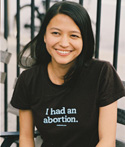About The Shirt
 About a year ago, I decide to work on a DIY (do-it-yourself) project to encourage women to “come out” about their abortion procedures. The political reason behind it was that I believe that one of the reasons it is so easy to demonize abortion is that the issue is often isolated from the very women (our mothers, sisters, friends, grandmas, selves) that have abortions. One bit of activism that got me thinking about this was Pat Beninato’s website—imnotsorry.net—where women could post counter-narratives to the “Abortion destroyed my life” stories circulated on pro-life web-sites such as Rachel’s Vineyard. Meanwhile, my feminist listserv (History-in-action) discussed how invisible the more common un-tragic abortion stories were in popular culture. One list-member, the writer Marge Piercy, suggested that there ought to be a film of women talking about their abortions. I thought it was a great idea and immediately called my friend Gillian Aldrich, a filmmaker who had worked with Michael Moore, to see if she wanted to collaborate. She did.
About a year ago, I decide to work on a DIY (do-it-yourself) project to encourage women to “come out” about their abortion procedures. The political reason behind it was that I believe that one of the reasons it is so easy to demonize abortion is that the issue is often isolated from the very women (our mothers, sisters, friends, grandmas, selves) that have abortions. One bit of activism that got me thinking about this was Pat Beninato’s website—imnotsorry.net—where women could post counter-narratives to the “Abortion destroyed my life” stories circulated on pro-life web-sites such as Rachel’s Vineyard. Meanwhile, my feminist listserv (History-in-action) discussed how invisible the more common un-tragic abortion stories were in popular culture. One list-member, the writer Marge Piercy, suggested that there ought to be a film of women talking about their abortions. I thought it was a great idea and immediately called my friend Gillian Aldrich, a filmmaker who had worked with Michael Moore, to see if she wanted to collaborate. She did.
In addition to the film, I made cards to be distributed to abortion clinics that read “If you’ve had an abortion, you don’t have to be sorry” and then listed resources such as non-judgmental counseling, the religious coalition for choice, ways to be involved politically, and how to raise money for your or another woman’s procedure. (I’ve distributed about 5000 of those.) The t-shirts, which were the third part of the campaign, popped into my head because the big march on Washington was coming up and I thought about all of the shirts that were being made for it: “George, Get Out of My Bush!” “Keep Your Laws off My Body!” “Abortion on Demand Without Apology!”—all of these exclamations, but no personal connection to the politically fraught procedure. I thought it would be a profound statement to wear a shirt that read, simply, “I had an abortion.”
I always understood that the shirts were rather shocking, but that was part the point. Not to offend people, but to ask why a shirt stating that a woman had undergone a safe, legal, and VERY common procedure (1.3 million women each year in the U.S. alone) was so outrageous. I initially sold the shirts out of my apartment and sent them with a note that included this:
Thanks for ordering the “I had an abortion” t-shirt! It is so much more than just a shirt; in fact, many have said that they can’t imagine wearing it in public. The power of the shirt lies in its challenging nature. It is a philosophical goad to reflect on the source and the grounds of our shame; it reminds us to vote. It is a potent statement to own the t-shirt, even if it never leaves your drawer. Wear the shirt when you feel comfortable—whether it is at the March for Women’s Lives on April 25th or just around the house—but the experience (and the t-shirt) are yours and you don’t have to be sorry.
After four months of selling the shirts from my apartment, Gloria Feldt agreed to sell the remaining 250 or so shirts (of 500) from the PPFA web-store. Given that I was 5 months pregnant and overwhelmed with other projects besides t-shirt distribution, I jumped at the chance. As you know, the shirts were on the site for a while (I don’t know exactly how long) when the Drudge item ran. They sold out within days.
Since January of 2004, I have received hundreds of letters and emails from women (and a few men) telling me their abortion stories, including many people who work at Planned Parenthood affiliates around the country. Many said that they hadn’t ever told anyone until they told me; others said that they had been terrified to tell their mother, only to do so and learn that she (and sometimes a grandmother!) had had an abortion as well. Many wrote to say that the shirt might never be worn publicly but it made them realize that they weren’t alone, that other women shared their story.
I know that not every pro-choicer approves of the shirt, but the outpouring of support from women who have had abortions and felt silenced or alone convinces me that they were, ultimately, a worthwhile part of this larger campaign to connect the issue of abortion with actual women’s lives.
--Jennifer Baumgardner, September 2004